Fancy pigeon refers to any breed of domestic pigeon, which is a domesticated form of the wild rock dove. They are bred by pigeon fanciers for various traits relating to size, shape, color, and behavior, and often exhibited at pigeon shows, fairs and other livestock exhibits.

The domestic pigeon is a pigeon subspecies that was derived from the rock dove or rock pigeon. The rock pigeon is the world's oldest domesticated bird. Mesopotamian cuneiform tablets mention the domestication of pigeons more than 5,000 years ago, as do Egyptian hieroglyphics. Research suggests that domestication of pigeons occurred as early as 10,000 years ago.

The Pouter or Cropper pigeons are domesticated varieties of the rock dove, Columba livia, characterized by a very large, inflatable crop. They are kept as ornamental or fancy breeds, valued for their unusual appearance. There are many varieties of pouter with little in common except for the nature of the crop. The origin of the breed group is unknown, but Pouters have been bred in Europe for at least 400 years.
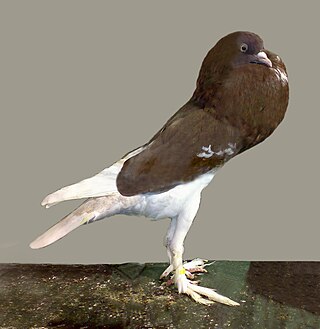
The English Pouter is a breed of fancy pigeon developed over many years of selective breeding. English Pouters, along with other varieties of domesticated pigeons, are all descendants from the rock pigeon. A breed with an enlarged crop, their distinctiveness was described by Charles Darwin in The Variation of Animals and Plants Under Domestication (1868).

The English Short-faced Tumbler is a breed of fancy pigeon developed over many years of selective breeding. English Short-faced Tumblers along with other varieties of domesticated pigeons are all descendants of the rock dove. The English Short-faced Tumbler is one of the oldest breeds referred to in John Moore's book Columbarium: or, The pigeon-house; being an introduction to a natural history of tame pigeons, giving an account of the several species known in England, with the method of breeding them, their distempers and cures.
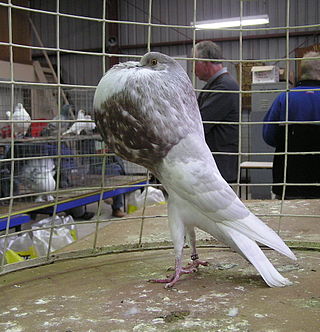
The Norwich Cropper is a breed of fancy pigeon developed over many years of selective breeding. The Norwich Cropper along with other varieties of domesticated pigeons are all descendants from the rock pigeon. The Norwich Cropper is thought to have been developed from a breed called the Oploper and is of Dutch origin.

The Pigmy Pouter is a breed of fancy pigeon developed over many years of selective breeding. Pigmy Pouters, along with other varieties of domesticated pigeons, are all descendants from the rock pigeon.

The Old German Cropper is a breed of fancy pigeon developed over many years of selective breeding. Old German Croppers, along with other varieties of domesticated pigeons, are all descendants from the rock pigeon.
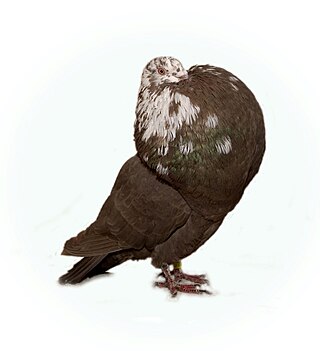
The Gaditano Pouter is a breed of fancy pigeon developed over many years of selective breeding. Gaditano Pouters, along with other varieties of domesticated pigeons, are all descendants of the rock dove.
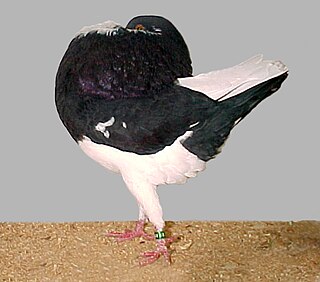
The Holle Cropper is a breed of fancy pigeon developed over many years of selective breeding. Holle Croppers, along with other varieties of domesticated pigeons are all descendants from the rock pigeon. This breed was developed in Holland.

The Ghent Cropper is a breed of fancy pigeon developed over many years of selective breeding. Ghent Croppers, along with other varieties of domesticated pigeons, are all descendants from the rock pigeon.

The South German Shield is a breed of fancy pigeon developed over many years of selective breeding. South German Shields, along with other varieties of domesticated pigeons, are all descendants from the rock pigeon. The whole bird is pure white except for the wing coverts which are colored.
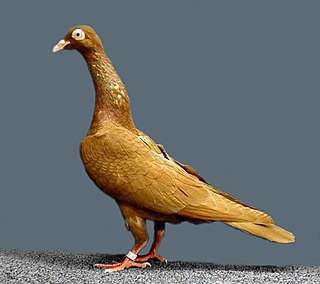
The Stargard Shaker, also called Zitterhall, is a breed of fancy pigeon developed over many years of selective breeding. Originally developed in Pomerania. Zitterhals have curved swan-like necks that tremble or shake in a way similar to Fantail pigeons. A Zitterhals pigeon was one of the champions at the 2007 NPA Grand Nationals.
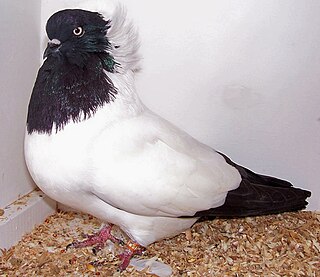
The Nun is a breed of fancy pigeon developed through many years of selective breeding. It was known as the Dutch Shell Pigeon in continental Europe. Nuns, along with other varieties of domesticated pigeons, are all descendants from the rock pigeon . The Nun is one of the oldest breeds and was originally a flying tumbler before being developed for exhibition. It is a mostly white breed, with a hood of feathers, which gives the name to the breed.
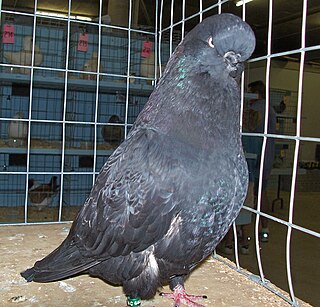
The English Long-faced Tumbler is a breed of fancy pigeon developed over many years of selective breeding. English Long-faced Tumblers, along with other varieties of domesticated pigeons, are all descendants of the rock dove.

The Thuringian Colour pigeons are a group of breeds of fancy pigeons developed over many years of selective breeding. Thuringian Colour pigeons, along with other varieties of domesticated pigeons, are all descendants from the rock pigeon . The breed group is known for several different colours and markings. Varieties include the Thuringian Breast, Thuringian Monk, Thuringian Shield (picture), Thuringian Whitetail and the Thuringian Spot. The breed can be either plain or shell crested, but is always clean-legged.
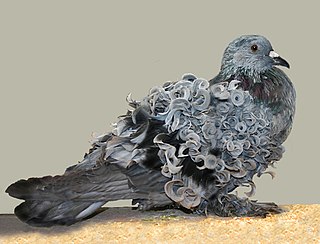
The Frillback is a breed of pigeon developed over many years of selective breeding. Frillbacks, along with other varieties of domesticated pigeons, are all descendants from the rock pigeon. The breed is known for the frill or curls on the wing shield feathers. The feather curl should also be present at the ends of the foot feathers or muffs.

The Reverse-wing Pouter is a breed of fancy pigeon developed over many years of selective breeding. Reverse-wing Pouters, along with other varieties of domesticated pigeons, are all descendants from the rock pigeon . The breed is known for its eye-catching markings.

















